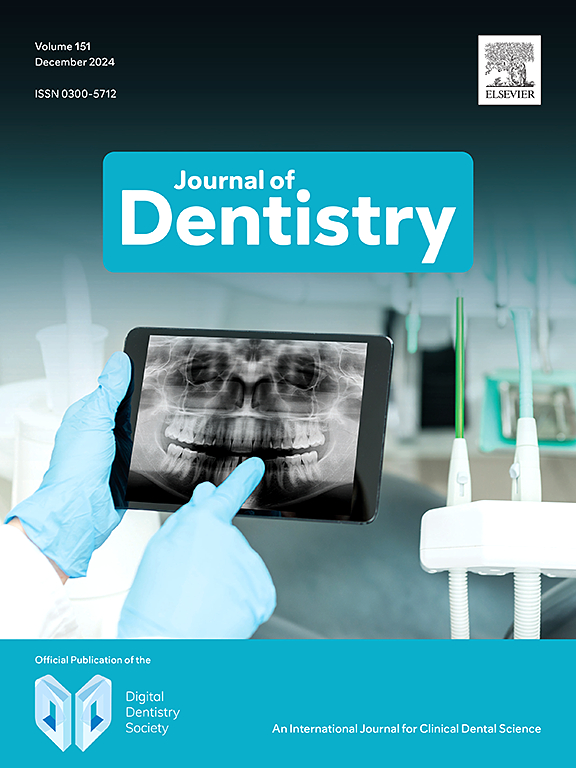评估3d打印树脂复合材料后牙固定修复体的持久性:一项为期3年的前瞻性临床试验。
IF 4.8
2区 医学
Q1 DENTISTRY, ORAL SURGERY & MEDICINE
引用次数: 0
摘要
目的:本临床试验旨在评估3d打印树脂复合固定义齿(fdp)用于后牙修复的临床性能。方法:2020年10月10日至2022年8月5日,对49例患者(女性33例,男性16例),年龄19 ~ 60岁,采用68个三单元3d打印树脂复合后路fdp (ELS Even Stronger, Saremco, Switzerland)进行治疗。安置两周后,由两名独立观察员使用修改后的外国直接投资标准对外国直接投资进行评估。评估的参数包括解剖形态、继发龋、边缘适应、表面粗糙度、颜色匹配、材料断裂、表面染色、边缘染色、解剖形态、保留、牙龈健康和患者满意度。故障分为机械故障和生物故障。结果:平均观察期22.36个月。在最后的回顾中,64个fdp中,24个仍在临床服务,没有任何并发症,表明有限的长期成功。在整个随访期间,几乎所有修复体都保持了正常的解剖轮廓。在最初的6个月期间,发现了9例骨折,随后在1年后发现了14例,在2年后发现了11例,在临床服务3年后发现了2例。在40例失败的fdp中,36例表现为机械故障,6例表现为生物故障(2例同时表现为机械故障和生物故障)。34例fdp出现内聚性骨折。2个fdp被重新粘接,4个基牙需要根管治疗,2个出现牙周问题。此外,2个fdp表现出表面光泽丧失,4个表现出颜色不匹配,4个表现出表面染色(均为4分)。Kaplan-Meier分析显示机械故障的生存率为40.7%,包括生物并发症的生存率为36.2%。结论:一项为期三年的随访研究结果表明,3d打印树脂复合fdp主要在连接器区域存在故障,这表明需要进一步改进设计。临床意义:三维打印树脂复合fdp具有一定的优势,但目前的修复可能被认为是长期临时的,因为主要是机械故障的发生率高达3年。临床试验注册:临床试验。州长,NCT04600297。本文章由计算机程序翻译,如有差异,请以英文原文为准。
Assessing the performance of 3D-printed resin composite posterior fixed dental prostheses: A 3-year prospective clinical trial
Objectives
This clinical trial aimed to assess the clinical performance of 3D-printed resin composite fixed dental prostheses (FDPs) for posterior restorations.
Methods
From October 10, 2020, to August 5, 2022, a total of 49 patients (33 females and 16 males), aged 19 to 60, were treated with 68 three-unit 3D-printed resin composite posterior FDPs (ELS Even Stronger, Saremco, Switzerland). Two weeks after placement, the FDPs were evaluated by two independent observers using modified FDI criteria. Parameters assessed included anatomical form, secondary caries, marginal adaptation, surface roughness, color match, material fracture, surface staining, margin staining, anatomical form, retention, gingival health, and patient satisfaction. Failures were classified as either mechanical or biological.
Results
The mean observation period was 22.36 months. At the final recall, of the 64 FDPs, 24 remained in clinical service without any complications, indicating limited long-term success. Almost all restorations maintained normal anatomical contours throughout the follow-up period. During the initial six-month period, 9 instances of fractures were identified, followed by 14 after 1 year, 11 after two-year a further 2 cases after a three-year period of clinical service. Of the 40 failed FDPs, 36 exhibited mechanical failures, while 6 showed biological failures (2 cases exhibited both and were counted in both categories). Thirty-four FDPs showed cohesive fractures. Two FDPs were re-bonded, four abutment teeth required endodontic treatment, and two presented periodontal issues. Additionally, 2 FDPs exhibited a loss of surface luster, 4 exhibited color mismatches, and 4 exhibited surface staining (all scored 4). Kaplan-Meier analysis revealed a 40.7 % survival rate for mechanical failures and a 36.2 % survival rate when biological complications were included.
Conclusions
The results of a three-year follow-up study indicated that 3D-printed resin composite FDPs present failures mainly in the connector region, suggesting the need for further design improvements.
Clinical Significance
Three-dimensionally printed resin composite FDPs offer certain advantages but current restorations could be considered as long-term provisional due to the incidence of mainly mechanical failures up to 3 years.
Clinical Trial Registration
Clinical Trials.Gov, NCT04600297.
求助全文
通过发布文献求助,成功后即可免费获取论文全文。
去求助
来源期刊

Journal of dentistry
医学-牙科与口腔外科
CiteScore
7.30
自引率
11.40%
发文量
349
审稿时长
35 days
期刊介绍:
The Journal of Dentistry has an open access mirror journal The Journal of Dentistry: X, sharing the same aims and scope, editorial team, submission system and rigorous peer review.
The Journal of Dentistry is the leading international dental journal within the field of Restorative Dentistry. Placing an emphasis on publishing novel and high-quality research papers, the Journal aims to influence the practice of dentistry at clinician, research, industry and policy-maker level on an international basis.
Topics covered include the management of dental disease, periodontology, endodontology, operative dentistry, fixed and removable prosthodontics, dental biomaterials science, long-term clinical trials including epidemiology and oral health, technology transfer of new scientific instrumentation or procedures, as well as clinically relevant oral biology and translational research.
The Journal of Dentistry will publish original scientific research papers including short communications. It is also interested in publishing review articles and leaders in themed areas which will be linked to new scientific research. Conference proceedings are also welcome and expressions of interest should be communicated to the Editor.
 求助内容:
求助内容: 应助结果提醒方式:
应助结果提醒方式:


